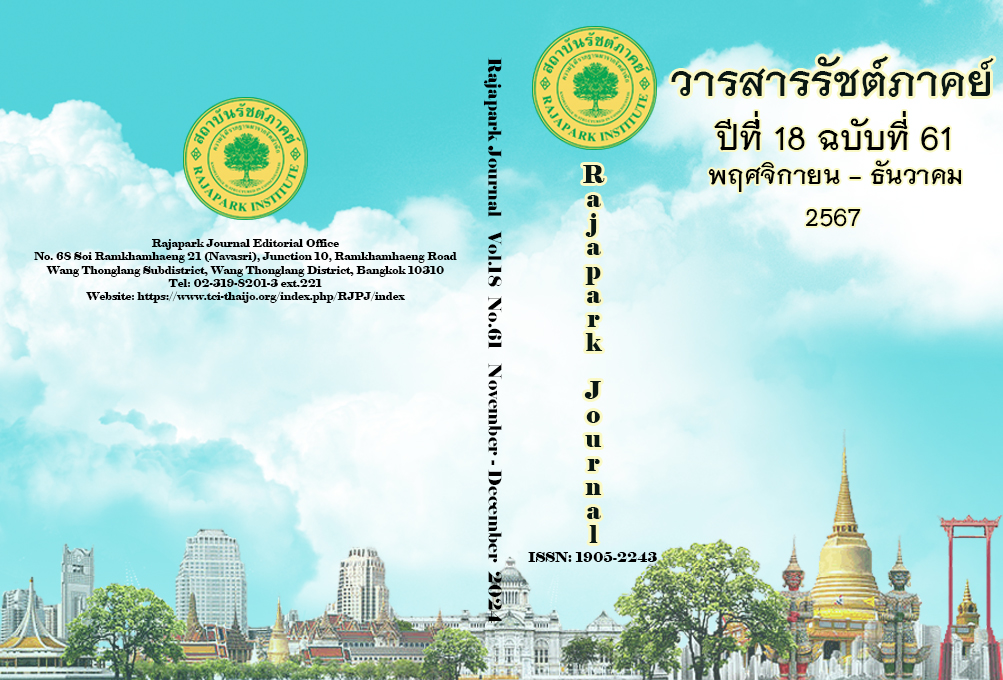Factors Affecting Service Performance of Hotel Employees in Chonburi Province
Main Article Content
Abstract
The aim of this study is fourfold: 1) To explore the relationship between emotional intelligence and the service performance of frontline employees in the hotel business in Chonburi. 2) To examine the relationship between emotional intelligence and work engagement. 3) To investigate the relationship between work engagement and service performance, and 4) to analyze the mediating role of work engagement on the relationship between emotional intelligence and service performance. Purposive sampling was designed with 300 employees working full-time in a hotel located in Chonburi. Data was collected via questionnaire and descriptive statistics, including frequency, percentage, average, and standard deviation, and hypotheses were tested by analyzing structural equation models employed to analyze data. The results indicated that 1. service performance was influenced by emotional intelligence; 2. emotional intelligence is also associated with employee work engagement; 3. work engagement has a positive relationship with service performance; and 4. the relationship between emotional intelligence and service performance was mediated by work engagement.
Article Details

This work is licensed under a Creative Commons Attribution-NonCommercial-NoDerivatives 4.0 International License.
Views and opinions appearing in the Journal it is the responsibility of the author of the article, and does not constitute the view and responsibility of the editorial team.
References
Abdullahi, M. S., Raman, K., & Solarin, S. A. (2022). Talent management practices on employee performance among academic staff of Malaysian private universities: employee engagement as a mediator. Journal of Applied Research in Higher Education, 14(1), 135-158. DOI:10.1108/JARHE-08-2020-0283
Arwab, M., Adil, M., Nasir, M., & Ali, M. A. (2022). Task performance and training of employees: The mediating role of employee engagement in the tourism and hospitality industry. European Journal of Training and Development, 47(9), 900-920.
DOI:10.1108/EJTD-01-2022-0008
Bank of Thailand. (2024). Tourism Indicators. https://app.bot.or.th/BTWS_STAT/statistics/ReportPage.aspx?reportID=875&language=eng
Barreiro, C. A., & Treglown, L. (2020). What makes an engaged employee? A facet-level approach to trait emotional intelligence as a predictor of employee engagement. Personality and Individual Differences, 159(2), 109892. DOI:10.1016/j.paid.2020.109892
Bar-On, R. (2000). Emotional and social intelligence: Insights from the Emotional Quotient Inventory (EQ-i). In R. Bar-On, & J. D. A. Parker (Eds.), Handbook of emotional intelligence (pp. 363-387). Jossey-Bass.
Bowen, D. E., Siehl, C., & Schneider, B. (1989). A framework for analyzing customer service orientations in manufacturing. Academy of Management Review, 14(1), 75-95. https://doi.org/10.2307/258192
Chonburi Provincial Statistical Office. (2023, April 10). Survey of the working conditions of the population, Chonburi Province. https://chonburi.nso.go.th/reports-publications/survey-project-report-sample-census/survey-of-the-working-conditions-of-the-population /survey-of-the-working-conditions-of-the-population.html
Gayathri, N., & Meenakshi, K. (2013). A literature review of emotional intelligence. International Journal of Humanities and Social Science Invention, 2(3), 42-51. https://www.researchgate.net/publication/281361394_A_Literature_Review_of_Emotional_Intelligence
Geraci, A., Di Domenico, L., Inguglia, C., & D'Amico, A. (2023). Teachers' emotional intelligence, burnout, work engagement, and self-efficacy during COVID-19 lockdown. Behavioral Sciences (Basel, Switzerland), 13(4), 296. https://doi.org/10.3390/bs13040296
Goleman, D. (2006). Working with emotional intelligence. Bantam Books.
Hair, J. F., Babin, B. J., Anderson, R. E., & Black, W. C. (2019). Multivariate data analysis (8th ed.). Pearson Prentice.
Harkison, T. (2017). The importance of the human touch in the luxury accommodation sector. Research in Hospitality Management, 7(1), 59-64. DOI:10.1080/22243534.2017.1355488
Kasikorn Research Center. (2024, May 4). Turnover within the hotel and accommodation business projected to improve steadily during 2024, but competition will remain intense and there is uneven recovery seen across the sector (Current Issue No.3489 Full Ed.)
https://www.kasikornresearch.com/en/analysis/k-econ/business/Pages/Hotel-CIS3489-08-05-2024.aspx
Kawilo, N., & Wirasophon, W. (2024). Guidelines for creating excellent service quality for front-end service staff of 5-star standard hotels in Bangkok. In Proceeding National & International Conference, 16(2), 509-517. http://www.journalgrad.ssru.ac.th/index.php
/8thconference/article/view/4627
López, G. (2021). The impact of managers’ emotional intelligence on dealing with difficult situations in the hospitality sector in Ireland[Master’s thesis, Dublin, National College of Ireland]. https://norma.ncirl.ie/id/eprint/5325
Lunkam, P. (2022, Nov). Business/Industry Trends 2022 – 2024: Hotel Business. Krungsri Research. https://www.krungsri.com/getmedia/aa9cf904-6514-4a14-a260-b24e2f7f6754/IO_Hotel_221125_TH_EX.pdf.aspx
Mundhra, E., & Pramanik, A. (2024). The impact of work engagement on employee work performance: Mediation role of work autonomy. International Journal of Indian Psychology, 12(1). 1786-1798. DOI:10.25215/1201.166
Obuobisa-Darko, T., Dogbe-Zungbey, O. D., Frimpong, F., & Sokro, E. (2023). Emotional intelligence and work engagement: The Moderating effect of work-related psychological impact due to the COVID-19 pandemic. Environment and Social Psychology, 9(1).
DOI:10.54517/esp.v9i1.1717
Rane, N. L., Achari, A., & Choudhary, S. P. (2023). Enhancing customer loyalty through quality of service: Effective strategies to improve customer satisfaction, experience, relationship, and engagement. International Research Journal of Modernization in Engineering Technology and Science, 5, 427-452.
Salovey, P., & Mayer, J. D. (1990). Emotional intelligence. Imagination, Cognition and Personality, 9(3), 185-211. https://doi.org/10.2190/DUGG-P24E-52WK-6CDG
Schaufeli, W., & Bakker, A. B. (2004). Job demands, job resources, and their relationship with burnout and engagement. Journal of Organizational Behavior, 25, 293-315. http://dx.doi.org/10.1002/job.248
Schumacker, R. E., & Lomax, R. G. (2010). A beginners guide to structural equation modeling. Routledge.
Sharma, S., & Saxena, P. (2024). Role of emotional and artificial intelligence in employee performance: A perspective from the Indian service industry. Abhigyan, 42(1), 43-56. DOI:10.1177/09702385241233078


